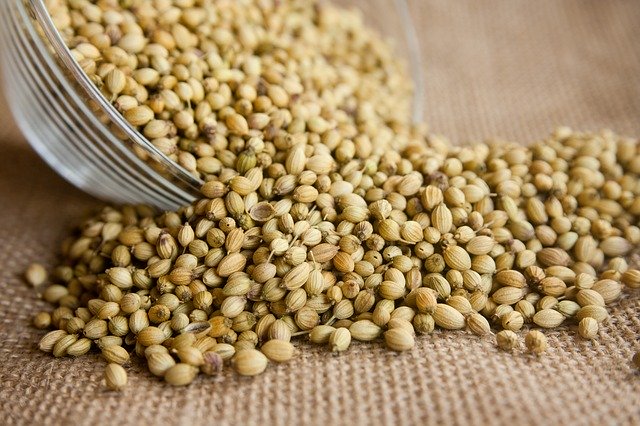What Is Coriander Essential Oil

Coriander Essential Oil is obtained by steam distillation from crushed ripe seeds of a plant botanically known as Coriandrum sativum.
Start Making Your Own Essential Oils- Check The Offer Bellow
Don’t Know How To Make Essential Oils? Click Here And Find Out
Coriander Essential Oil Uses
Coriander is one of the most used spices worldwide with several health benefits, especially valued for its digestive and stomachic benefits. Coriander seeds were even found in the ancient Egyptian tomb of Rameses II, which shows us how important Coriander was for ancient people. Not just as a spice, also as medicine in the form of tea for treating various health concerns. Therapeutical uses of Coriander Essential Oil include treating digestive problems, flatulence, dyspepsia, bloating, indigestion, diarrhea, abdominal spasm, abdominal discomfort, irritable bowel syndrome, for detoxifying, nervous tension, muscular fatigue, muscular aches and pains, mental fatigue, poor circulation, emotional exhaustion, and nervous exhaustion.
Coriander Essential Oil Benefits
Therapeutical properties are known as an analgesic, aperitif, aphrodisiac, antioxidant, antirheumatic, antispasmodic, bactericidal, depurative, digestive, carminative, cytotoxic, fungicidal, larvicidal, lipolytic, regenerative, revitalizing, stimulant, sedative, and stomachic.
About Coriander Essential Oil![Itineranttrader [Public domain] Itineranttrader, Public domain, via Wikimedia Commons](https://whatcure.com/wp-content/uploads/2019/08/64px-CorianderEssOil.png)
Coriander Essential Oil is a colorless to pale yellow liquid with a warm, sweet, woody-spicy, slightly musky aroma. It blends well with bergamot, black pepper, cardamom, cinnamon leaf, clary sage, frankincense, ginger, juniper berry, lemon, melissa, orange, palmarosa, sandalwood, spearmint, and ylang-ylang.
Essential Oil Safety Guide For Coriander Essential Oil
Coriander essential oil is considered generally non-toxic, non- irritant, and non- sensitizing. Avoid using it during pregnancy or while breastfeeding. Despite GRAS status, essential oils shouldn’t be ingested, unless it’s done under a doctor supervision. Use it topically in a diluted form. Dilute up to 5 drops of essential oil to a tablespoon of carrier oil ( 1% ).
Check The Latest OFFER of Coriander Essential Oil- CLICK HERE
Top 30 Health Benefits Of Coriander Essential Oil
- promotes digestion
- tones stomach
- eliminates toxins from the body
- aids diabetes
- regulates the level of cholesterol
- stimulates hormone secretion
- soothes joint and muscles discomfort
- purifies the blood
- alleviates nausea
- helps you lose weight
- increases libido
- natural aphrodisiac
- toning and rejuvenating to the skin
- alleviates menstrual discomfort
- treats toothache, headache, and earache
- treats spasms
- eliminates intestinal gas
- reduces pain
- treats fungal and bacterial infections
- improves appetite
- aids bronchial congestion
- treats coughs, colds, and influenza
- eases anxiety, stress, and depression
- alleviates tension
- improves circulation
- treats arthritis, gout, and rheumatism
- improves anorexia
- soothes nervous system
- stimulant
- eliminates bad breath
♦️Learn More About Essential Oils- Click Here♦️
Reference:
- Ann, V., 2016. The Complete Book Of Essential Oils And Aromatherapy, Revised And Expanded: Over 800 Natural, Nontoxic, And Fragrant Recipes To Create Health, Beauty, And Safe Home And Work Environments. New World Library.
- Lawless, J., 2013. The Encyclopedia Of Essential Oils: The Complete Guide To The Use Of Aromatic Oils In Aromatherapy, Herbalism, Health, And Well Being. Conari Press.
- Wikipedia: https://en.wikipedia.org/wiki/Coriander
- Coriander (Coriandrum sativum L.) essential oil: its antibacterial activity and mode of action evaluated by flow cytometry: https://www.ncbi.nlm.nih.gov/pubmed/21862758
- Antioxidant and hepatoprotective potential of essential oils of coriander (Coriandrum sativum L.) and caraway (Carum carvi L.) (Apiaceae): https://www.ncbi.nlm.nih.gov/pubmed/20608729
Disclaimer: All information presented on this website is for informational purposes only. These statements have not been evaluated by the Food and Drug Administration. This website is not intended for diagnosis, treatment, treatment or prevention of disease and is not intended for substitution treatment. This information is not meant to cover all possible uses, precautions, interactions or adverse effects. This information may not fit your specific health circumstances. Never delay or disregard seeking professional medical advice from your doctor or other qualified healthcare providers because of something you have read on whatcure.com. Please seek the advice of a healthcare professional for your specific health concerns.







